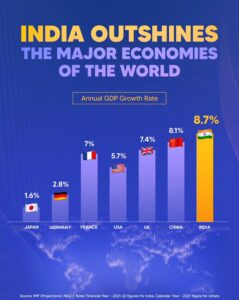China’s meteoric rise as an economic and military power has undoubtedly altered the global landscape, placing India, its southern neighbor, in a delicate geopolitical position. India, the world’s second-most populous country, is now navigating a complex balancing act, seeking to maintain a productive relationship with China while simultaneously strengthening its ties with other major powers, particularly the United States.
China’s Economic Prowess

China’s economic growth over the past few decades has been nothing short of extraordinary. In 2022, China surpassed the United States to become the world’s largest economy, a testament to its robust manufacturing sector, technological advancements, and massive infrastructure projects. This economic prowess has significantly enhanced China’s global influence, making it a major player in international trade and investment.
India’s Economic Transformation

While China’s economic growth has been the envy of many, India has also experienced significant economic transformation in recent years. India’s economy is now the fifth largest in the world, and it is projected to become the world’s third-largest economy by 2030. This growth has been driven by a combination of factors, including a burgeoning middle class, increased foreign investment, and a growing emphasis on innovation and entrepreneurship.
Geopolitical Considerations

Despite their shared economic interests, China and India have a complex geopolitical relationship. The two countries share a long and disputed border, and they have a history of military skirmishes. In recent years, China’s assertiveness in the South China Sea and its growing military presence in the Indian Ocean have raised concerns in India.
Also Read: China’s Debt-Trap Diplomacy: A Closer Look at its Impact on Countries
India’s Balancing Act
In response to China’s growing power, India is seeking to strengthen its ties with other major powers, particularly the United States. India has participated in joint military exercises with the United States and other Quadrilateral Security Dialogue (Quad) members, including Japan and Australia. The Quad is seen as a counterbalance to China’s influence in the Indo-Pacific region.
Also Read: India Will be a $5 Trillion Economy, Says the Economic Survey
India is also seeking to expand its economic ties with other countries, including Russia and the European Union. India is also a member of the Shanghai Cooperation Organization (SCO), a regional security grouping that includes China, Russia, and several Central Asian countries.
Challenges and Opportunities
India’s balancing act between China and other major powers is a delicate one. The country must carefully manage its relationships with these powers to avoid being drawn into a regional conflict. At the same time, India must also ensure that it does not alienate China, which remains a major trading partner.
Despite the challenges, India also has several opportunities to capitalize on its strategic position. The country’s large and growing population, its skilled workforce, and its vibrant democracy make it an attractive partner for foreign investment. India is also well-positioned to play a leading role in regional and global affairs.
Conclusion
China’s rise has undoubtedly altered the global landscape, and India is now at the center of this geopolitical shift. India’s efforts to balance its relationship with China while strengthening its ties with other major powers will be critical to maintaining regional stability and prosperity.
![]()



